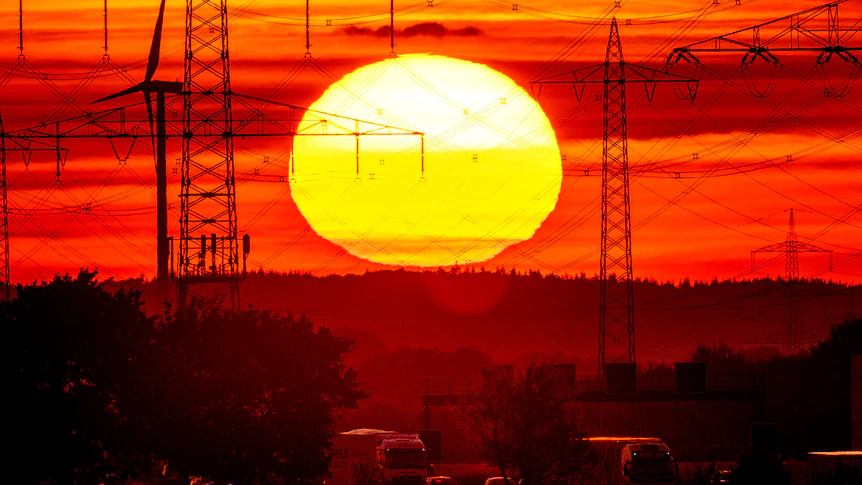Copyright abc

This year is set to be the second or third warmest year on record, according to a new report from the World Meterological Organization (WMO). According to the report, the past 11 years, 2015 to 2025 have been the 11 warmest individual years in the 176-year observational record. The State of the Global Climate Update for COP30 report states the past three years have been the three warmest in that time. WMO Secretary General Celeste Saulo said the data shows an "unprecedented streak of high temperatures". "It will be virtually impossible to limit global warming to 1.5C in the next few years without temporarily overshooting this target," she said. The 1.5C global warming target is one of the key goals of the United Nations Paris Agreement to limit the increase in the global average temperature above pre-industrial levels. "Each year above 1.5C will hammer economies, deepen inequalities and inflict irreversible damage," said UN Secretary General António Guterres. The report found that in 2024 the three key greenhouse gases in the atmosphere — carbon dioxide (CO2), methane (CH4) and nitrous oxide (N2O) — reached record-high observed levels. Blair Trewin, a climate scientist the Bureau of Meteorology (BOM) and co-author of the WMO report said greenhouse gases was the main reason for the increased temperature trends. "The expectation is that with the current warming levels being in that 1.3C to 1.4C range, unless something unexpected happens, we would expect the current warming level to reach 1.5C in the next few years." Data shows consistent warming For January to August 2025, the mean near-surface temperature was 1.42C above the pre-industrial average. That means, the year 2025 is on track to be in the three warmest years on record, according to the report. Professor of Climate Science in the Fenner School of Environment and Society at ANU Sarah Kirkpatrick says the data shows global warming is "definitely not a future problem". "The symptoms are there, it's getting worse, we're putting more carbon dioxide in the atmosphere, things aren't starting to get better," she said. The global mean near-surface temperature from January to August 2025 did drop slightly from 2024, which was the highest year on record. However, the 26-month period from June 2023 to August 2025 saw only one month with an average temperature cooler than the same month from 2022 or before. That dates back to 1850 when records began. Professor Kirkpatrick says the increase in temperature brings with it worsening severe weather, including heatwaves. "Heatwaves are very closely linked to global average temperature with even slight increases in temperature results in an increase in the frequency, duration and severity of heatwaves worldwide," she said. "Virtually everywhere in the world has seen an increasing heatwaves over the last 60, 70, 80 years and we know with the more carbon dioxide in the atmosphere that's only going to get even worse." Ocean heat at highest level In 2024, ocean heat content was at the highest it had ever been recorded and according to the WMO report, the early months of 2025 indicate it has continued to rise. "Ocean heat content is looking at what's going on not just at the surface of the ocean but in the top 2,000 metres of the ocean," Dr Trewin said. "What this data is telling you is that the whole bulk of the ocean is warming." The observed warming of the oceans is a sign that "the Earth is currently out of energy balance", the report said. This has far-reaching consequences too, according to the report including the degradation of marine ecosystems. "With warmer oceans there are potentially significant eco-system impacts, both with the warmer temperatures directly also as the oceans take up more carbon dioxide from the atmosphere they become more acidic," he said. He added that a warmer ocean means more moisture content in the air which leads to more intense rainfall around the world. On top of all that, the report says the ocean warming means more frequent and intense tropical and subtropical storms and it is a driver of sea-level rise. Sea level rising as ice melting Another topic addressed in the report is rising sea levels and the fastening melting of the ice caps. The report states the long-term rate of sea level rise has increased since the start of record keeping. Currently it is rising 4.1 millimetres a year which is a rise of 2.1mm a year which was last recorded in 2002. This rise is a sign of the ocean warming and highlights the melting of glaciers and ice sheets at record pace. The World Glacier Monitoring Service indicated a global annual mass loss of 1.3 metres of water equivalent of ice at all monitored glaciated regions around the world in 2024. That is equal to 450 gigatonnes of ice melted. A single gigatonne is equivalent to the mass of all the land mammals in the world (excluding humans). One gigatonne of ice would fill 400,000 Olympic-sized swimming pools. It has contributed to about 1.2mm of global mean sea level rise and is the largest loss of ice on record back to 1950. 2024 was the also the third consecutive year that all of the monitored glaciated regions in the world recorded net mass loss. 1.5C target 'implausible' The WMO says it is not all doom and gloom and that the science shows temperatures can be brought back down under the targets set out in the Paris Agreement. "The science is equally clear that it's still entirely possible and essential to bring temperatures back down to 1.5C by the end of the century," Ms Saulo of the WMO said. Dr Kirkpatrick says keeping temperatures under the UN's 1.5C target "seems so improbable it's not funny". "The next 10 possible more likely 20 years will be above that 1.5C threshold and without drastic action … we're not going to stabilise at 1.5C," she added. "In fact what would happen is we overshoot, so we pass 1.5C and with that would come a lot of irreversible impacts no matter how much carbon we're able to suck out later down the track." Whatever the case, the UN secretary general made clear, action must be taken immediately. "We must act now, at great speed and scale, to make the overshoot as small, as short, and as safe as possible — and bring temperatures back below 1.5C before the end of the century," Mr Guterres said. COP30, the United Nations climate change conference, starts on November 10 in Brazil and will be attended by 53 world leaders.



